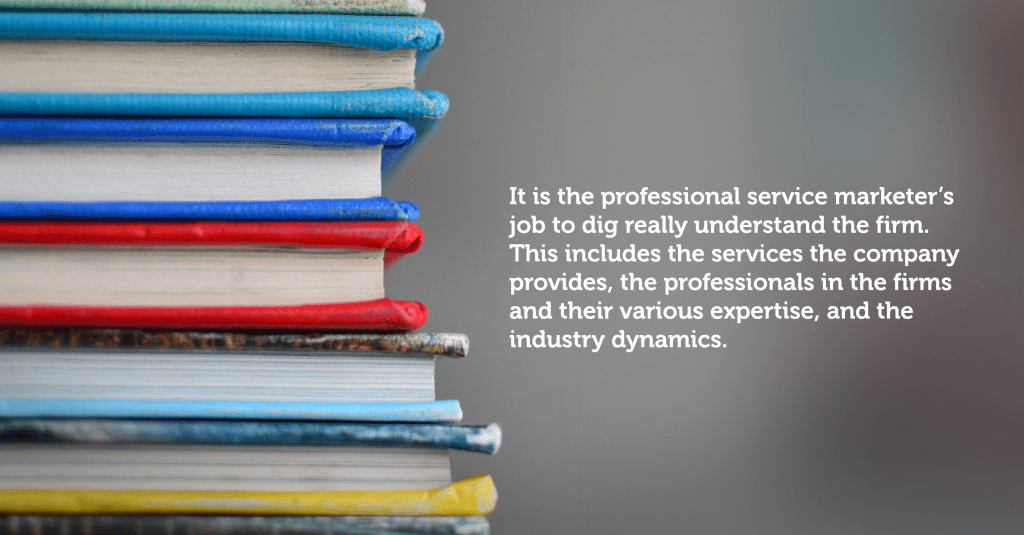Fixing the Top Challenge in Professional Services Marketing
The experts providing professional services invest years in
learning their subject areas. They take mandatory training and exams to gain
expertise and test their knowledge. Clients benefit from all that hard work.
Yet the nuances and specificity of the field can make professional services
marketing challenging.
In providing strategic and tactical professional marketing services for over 15 years, we’ve seen one stumbling block consistently. The biggest marketing challenge professional services firms face is puzzling: Their marketers don’t fully understand what they’re marketing.
Professional services marketing is not as straightforward as
marketing a widget. The people, and the services they deliver, are the product.
Marketing a professional services firm requires a deep understanding of the
firm’s experts and their specialty areas.
While marketers don’t need the professionals’ level of technical expertise, they do need to be fully immersed in what that firm does to be able to craft a strong position for the company. Marketers need knowledge of what the company does and the nuances of its industry – along with who it targets, how it’s different, and who are its competitors. Without drawing on all these components, the marketer can’t develop messaging that actually makes that company stand out.
So, how does a professional services marketer develop that deeper understanding of all the firm does, how it does it, and what that means in the market?
Having worked as a fractional CMO for an environmental consulting and commercial real estate firm for the past five years, and a CPA firm even longer, I have some suggestions.

Learn on the job.
It is the professional service
marketer’s job to dig in and really understand the firm. Marketers coming into
positions at professional services firms must, from day one, view it as part of
their job to understand as much as possible. That means learning about the
services the company provides, the professionals in the firms and their various
expertise, and the industry dynamics. Having that background and becoming a
subject matter expert (SME) in the marketing assets within the company is
essential to the brand and the positioning in the marketplace.
The marketer is unlikely to get paid
to sit and study. S/he will have to take the initiative and invest after hours
and weekend time in learning. But the mindset needs to be, “I am going to have
to learn whatever technical knowledge I can in order to be effective.”
After all, a big part of marketing
today, especially in professional services marketing, is thought leadership. It’s
a double whammy. People or companies hiring these service firms are looking for
experts in what they do – not only in particular technical expertise but also
in applying that expertise in specific industries and sectors.
If the marketer doesn’t do in-depth
learning, there’s no way s/he can write effective content. It won’t be
sophisticated enough to develop and nurture prospects and also engage existing
clients.
Train like a technical professional.
The new marketer can ask to be part of any training for incoming technical professionals for the firm. It can be very helpful to hear and learn some of the things the service delivery pros are taught when they first join.
Other firms will have formal training platforms. New CPAs or engineers may be asked to watch various videos, perhaps to understand how that firm goes about its services or to train on specifics of their specialties. Even though the marketer won’t ever be asked to do that work, going through the training modules can pay off in technical knowledge gained.
Additionally, by participating in
introductory sessions where possible, the marketer can also make some
connections with SMEs, who can help them down the road when greater specificity
is needed.
Review client deliverables.
Another thing marketers can do is read the documents that are presented to clients. The deliverables will hold a lot of information about what the professionals do to create those reports or studies. They often include discussion of the professional process as well as pictures, diagrams, observations, and conclusions. All of this can help the marketer get familiar with various services.
At the environmental consulting firm I work with as CMO, for instance, I had to learn a crazy amount of acronyms. But I needed to not only understand what PCA or FCA or SRA stood for, but the specifics of the services and which audience would require which one. Anyone can Google an acronym. A good professional services marketer will get to know not only what those initials stand for, but the distinct value proposition for each one. Reading the deliverables helped me learn about target audience as well as what the professionals were tasked with doing and what they delivered.
Interview subject matter experts about their trade.
Firm professionals will often carve out time for new marketers if they show the initiative of inviting them to an informational coffee or lunch. It’s important, of course, to show up prepared. Do research beforehand, and have a list of questions. I’d also suggest recording the conversation, so it’s possible to listen to that discussion again when feeling confused.
An added benefit of this approach is
that the pros will often make suggestions of other places the marketers can get
information. Before they know it, they’ll have your own library of knowledge.

Review proposals.
Reviewing the client proposals the firm puts together can be as useful as reading the final products that go out to clients. Many times, the firm is not just bidding on one service. They propose delivery of multiple services to solve the specific set of problems the prospect or client has.
Taking time to understand the combinations of services and how they work together can help the marketer learn target audience pain points, the language they use to explain their pains, and how the firm provides solutions.
Participate in sales calls.
Another way to dig in and learn is to ask to be a fly on the wall for sales phone calls or pitch meetings. It’s a way to hear what the salespeople say to prospects, what the prospects ask, and how salespeople respond to the questions. That dialogue can help the service firm marketer understand what prospects really care about in terms of engaging a firm.
Attending a sales call at Starbucks
headquarters with a client recently – even though I’d been working for the
client for years – recently gave me a lot to think about in terms of what they
were looking for and our messaging.
That leads to the final piece of advice for professional service marketers.
Always be learning.
Don’t make a big effort to learn the technical side at the start, then expect that to apply forever. The industry will evolve. Customer needs will change. Your company’s offerings and differentiation in the market will be shaped by those shifts.
As the industry will continuously evolve, the marketer’s knowledge of the professional services firm should too.
To learn more about marketing department structure, download our free guide below:






